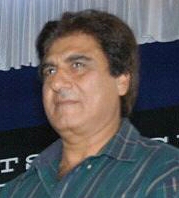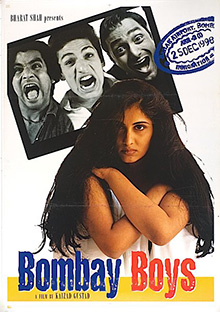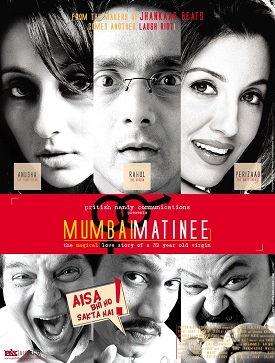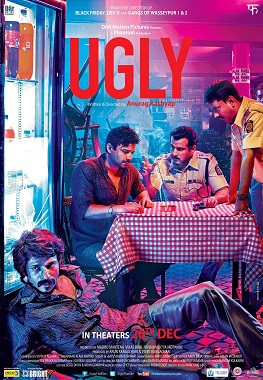Related Research Articles

Rahul Bose is an Indian actor and athlete who works in Hindi films. Bose is the president of Rugby India.

Black Friday is a 2004 Indian Hindi-language crime film written and directed by Anurag Kashyap. Based on Black Friday: The True Story of the Bombay Bomb Blasts, a book by Hussain Zaidi about the 1993 Bombay bombings, it chronicles the events that led to the blasts and the subsequent police investigation. Produced by Arindam Mitra of Mid-Day, the film stars Pawan Malhotra, Kay Kay Menon, Aditya Srivastava, Kishor Kadam and Zakir Hussain.

Raj Babbar is an Indian Hindi and Punjabi film actor and politician belonging to Indian National Congress. He is a three-time member of the Lok Sabha and a two-time member of the Rajya Sabha. He was the state President of Uttar Pradesh Congress Committee.
The Wadia family is a Parsi family from Surat, India, currently based in Mumbai, India. The family rose to wealth in the mid-1700s as shipbuilders serving the British East India Company as the latter established its sway over India.

Mary Ann Evans, also known by her stage name Fearless Nadia, was an Australian-Indian actress and stuntwoman, who worked in Indian cinema. She is most remembered as the masked, cloaked adventurer in Hunterwali, released in 1935, which was one of the earliest female-led Indian films.

Bombay Boys is a 1998 Indian crime comedy film written and directed by the Indian director Kaizad Gustad. It follows the adventures of three young men in modern-day Mumbai. The boys are of Indian origin, but were all raised in the West. Krishna Sahni is an aspiring actor from New York City who wants to make it big in Bollywood. Ricardo Fernandes is from Sydney and is in Mumbai to search for his long-lost brother. Finally, Xerxes Mistry, a musician from London, is looking to discover his "roots" in the land of his ancestors.

Mumbai Matinee is a 2003 Indian romantic comedy film directed and written by Anant Balani and starring Rahul Bose as a 32-year-old virgin. The film premiered on 26 September 2003 and was also released in the UK. Director Anant Balani died before the film was released on 29 August 2003.

Dil Kabaddi is an Indian Hindi film directed by debutante Anil Sharma. The film stars Irrfan Khan, Rahul Bose, Konkona Sen Sharma, Soha Ali Khan, Payal Rohatgi, Rahul Khanna, and a special appearance by Rahat Fateh Ali Khan.
The KASHISH Pride Film Festival is an annual LGBTQ event that has been held in Mumbai, India, since 2010. The film festival screens gay, lesbian, bisexual, transgender and queer films from India and around the world. It is voted as one of the top five LGBT film festivals in the world.

Love Sex Aur Dhokha is a 2010 Indian Hindi-language anthology found footage drama film directed by Dibakar Banerjee and written by Banerjee and Kanu Behl. Jointly produced by Ekta Kapoor, Shobha Kapoor and Priya Sreedharan under the banner of ALT Entertainment, the film stars mostly newcomers including Anshuman Jha, Nushrat Bharucha, Rajkummar Rao, Neha Chauhan, Amit Sial, Herry Tangri and Ashish Sharma. It has three separate but interlinked stories about an honour killing, an MMS scandal and sting operations.

Ramachandrapurapu Raj Rao is an Indian writer, poet and teacher of literature who has been described as "one of India's leading gay-rights activists". His 2003 novel The Boyfriend is one of the first gay novels to come from India. Rao was one of the first recipients of the newly established Quebec-India awards.

Riyad Vinci Wadia was an Indian independent filmmaker from Bombay, known for his short film, BOMgAY (1996), possibly the very first gay themed movie from India. Born into the filmmaking Wadia family, he inherited the production company Wadia Movietone which is known for the Fearless Nadia movies which are one of their kind in the superwoman and stunt genre when other movies of their time usually portrayed women in submissive roles. Wadia is also known for his award-winning documentary on Nadia, Fearless: The Hunterwali Story (1993), which was written about in Time magazine and made a name for Riyad at the very outset of his brief but impactful career.

LGBTQ people are well documented in various artworks and literary works of Ancient India, with evidence that homosexuality and transsexuality were accepted by the major dharmic religions. Hinduism and the various religions derived from it were not homophobic and evidence suggests that homosexuality thrived in ancient India until the medieval period. Hinduism describes a third gender that is equal to other genders and documentation of the third gender are found in ancient Hindu and Buddhist medical texts. The term "third gender" is sometimes viewed as a specifically South Asian term, and this third gender is also found throughout South Asia and East Asia.

Homi Wadia was an Indian film director and producer in Bollywood. He was the co-founder of Wadia Movietone productions, established in 1933 and later after the closure of Wadiatone, he founded Basant Pictures in 1942. In a career spanning five decades, he directed over 40 films, including Hunterwali (1935), Miss Frontier Mail (1936), Diamond Queen (1940), Shri Ram Bhakta Hanuman (1948) and fantasy film Hatim Tai (1956). He was also a founding member of the Film & Television Producers Guild of India, established in 1954. Homi Wadia was married to actress and stunt woman Fearless Nadia. Homi was the younger brother of JBH Wadia, who was himself a movie director.
Jamshed Boman Homi Wadia, commonly referred to as J. B. H. Wadia, was a prominent Bollywood movie director, screenwriter, producer and founder of Wadia Movietone Studio. He was born in prominent Parsi family which hailed from Surat, Gujarat whose ancestral business was ship building. Their family name of Wadia stands for master shipbuilders. In a family of entrepreneurs Wadia is credited with creation of movies involving populist stunt roles including those by Fearless Nadia and bringing concept of stunt actresses in Indian cinema.

Ugly is a 2013 Indian Hindi-language thriller film written, co-produced and directed by Anurag Kashyap. Jointly produced by Phantom Films and DAR Motion Pictures, the film stars Rahul Bhat, Ronit Roy, Tejaswini Kolhapure, Vineet Kumar Singh, Girish Kulkarni, Surveen Chawla and Anshika Shrivastava in the lead roles. It also features TV actor Abir Goswami in his last film appearance before his death in 2013. Told in the course of a week, Ugly follows the story of a struggling actor Rahul Varshney (Bhat), whose daughter Kali (Shrivastava) disappears, and the events that follow.

Hunterwali is a 1935 Indian Hindi-language action film by the Wadia Movietone company of Bombay, featuring Fearless Nadia as the heroine. A story of a princess who fights injustice as the masked crusader Hunterwali, the film propelled Nadia and the Wadia brothers of Wadia Movietone to fame.

Wadia Movietone was a noted Indian film production company and studio based in Mumbai, established in 1933 by Wadia brothers J. B. H. Wadia and Homi Wadia. It was most known for stunt, fantasy and mythological films, including Hunterwali (1935).

The Boyfriend, written in 2003 is R. Raj Rao's first novel. Based in Mumbai, India, it discusses the city's gay subculture against a backdrop of the 1992 riots and discusses caste, class and masculinities.
References
- 1 2 3 Aswin Punathambekar (2008). Global Bollywood. NYU Press. p. 151. ISBN 978-0814747988.
- ↑ Hoshang Merchant (2011). Yaraana: Gay Writing from South Asia. Penguin Books India. p. 106. ISBN 978-0143064947.
- 1 2 3 Riyad Vinci Wadia (2001). "Long Life of a Short Film". In Andrew Grossman (ed.). Queer Asian Cinema: Shadows in the Shade, Volume 39. Psychology Press. pp. 313–323. ISBN 1560231394.